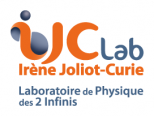Scientific background
The Rubin-LSST (Large Survey of Space and Time) project is a deep sky survey using an 8.40m diameter telescope equipped with a 3.2 billion pixel camera. Starting in 2024, it will map the southern hemisphere sky over a 10-year period, with 800 photometric measurements per object, obtained across 6 wide visible bandwidths. This survey will not only enable precise measurement of cosmological parameters, but also revolutionize studies of the variable sky.
In order to measure atmospheric transparency in real time, a spectrograph equipped with a holographic optical component developed at IJCLab and LPNHE and produced in France, is installed on an auxiliary telescope in operation since early 2021. The atmospheric compensation process we are developing involves measuring the transmission of the atmosphere with this spectrograph, and then using it to restore flux estimates in the main telescope’s broad bands, relative to “standard” atmospheric conditions. The aim is to achieve photometric accuracy of the order of 0.1%, even under unstable atmospheric conditions – a remarkable breakthrough.
Environment
The IJCLab LSST Group comprises a group of ten or so researchers, teacher-researchers and engineers with expertise in astronomy, astrophysics and cosmology.
Our team developed the slitless spectroscopy device used on LSST’s auxiliary telescope (AuxTel). It is thus at the forefront of the study of atmospheric corrections for photometry. In particular, our expertise in atmospheric models enables us to link measurements of atmospheric transmittance to the fundamental parameters of aerosols, ozone and precipitable water vapour.
The team’s LSST work is integrated into a highly visible national structure (Rubin observatory LSST-France), represented on the decision-making bodies of LSST and IN2P3.
Technical and scientific activities
The post-doctoral fellow will participate in the start-up of the LSST telescope at the Vera Rubin Observatory, and will be able to exploit the first data for scientific analyses in cosmology. He or she will be able to devote between 30% and 50% of his or her time to scientific analyses of the first LSST data, preferably in connection with the IJCLab group’s activities on dark energy and dark matter.
His/Her technical contributions will focus on optimizing atmospheric calibration with observations from the auxiliary telescope, and will cover the following aspects:
- Development of a calibrator observation strategy by Auxtel, adapted to the main telescope’s pointing sequence.
- Measurement of atmospheric transmission for each LSST observing direction, with estimation of statistical and systematic errors.
- Prediction of the color compensation to be applied to the instrumental magnitudes for all sources in each LSST image; this compensation is related to atmospheric transmission but also depends on source colors; estimation of residual photometric errors. The aim is to bring back each photometric measurement to a reference atmosphere situation (standard atmosphere with airmass = 1.2).
This atmospheric calibration work will have a direct impact on the accuracy of photometric redshifts and light curves for transient events. It will also have an impact on the accuracy of cosmological measurements derived from the analysis of large-scale structures in the Universe, as well as on the measurement of the Universe’s expansion via type Ia supernovae.
Candidate profile, expected skills
The candidate must hold a PhD in astrophysics or fundamental physics. He/She should have good computer skills, particularly in data analysis. Observation experience with large telescopes will be appreciated. The candidate should be fluent in written and spoken English and/or French, the two working languages of the host group.
Position duration, location
The position, based at the Laboratoire des deux infinis Irène Joliot-Curie (IJCLab-CNRS, Orsay, France), is for 3 consecutive years, starting in February 2024 or later.
Travel
The successful candidate will be required to travel for technical and observational missions, and to participate in meetings, workshops and conferences, both nationally and internationally.
Salary conditions
35904€ to 51996€ per year (2992€ to 4333€ per month), depending on the candidate’s experience. This amount includes social security contributions, in particular general health insurance. The net salary after these deductions is approximately 80% of the gross salary.
How to apply
Applications must be submitted via the CNRS job portal
https://emploi.cnrs.fr/Offres/CDD/UMR9012-SOPHEB-056/Default.aspx?lang=EN
Applicants should submit a detailed CV and cover letter.
Letters of recommendation should be sent to marc.moniez@ijclab.in2p3.fr. A committee will be set up to interview pre-selected candidates. These interviews may take place remotely.









